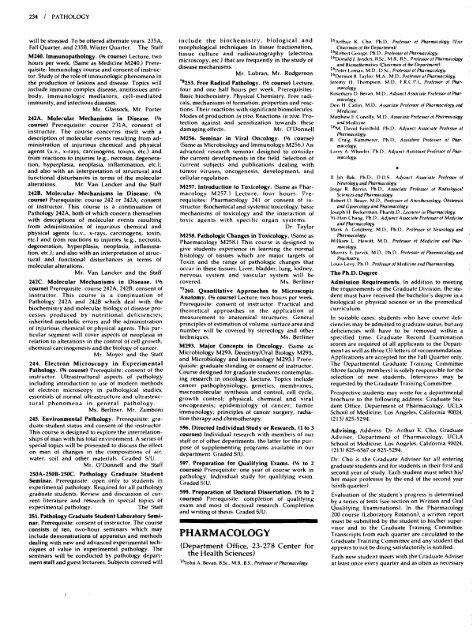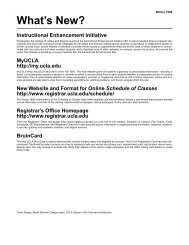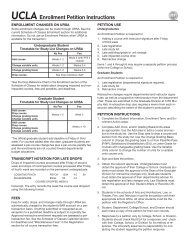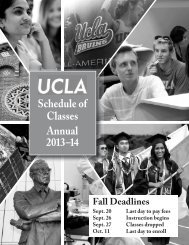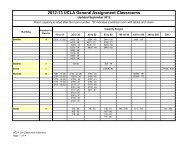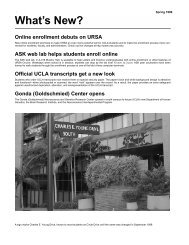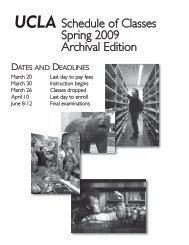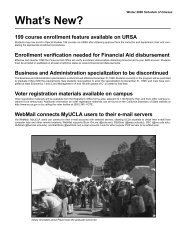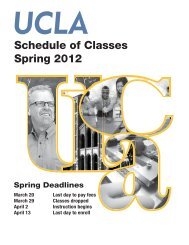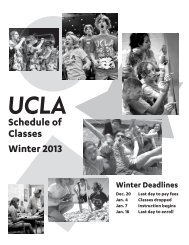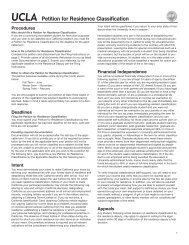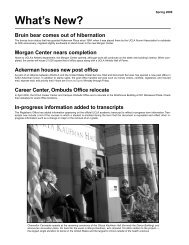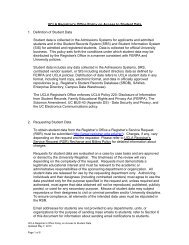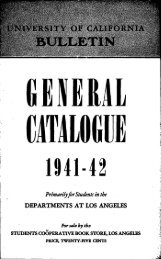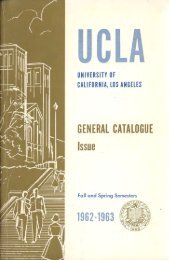UCLA Graduate Catalog 1980-81 - Registrar - UCLA
UCLA Graduate Catalog 1980-81 - Registrar - UCLA
UCLA Graduate Catalog 1980-81 - Registrar - UCLA
You also want an ePaper? Increase the reach of your titles
YUMPU automatically turns print PDFs into web optimized ePapers that Google loves.
234 / PATHOLOGY<br />
will be stressed. To be offered alternate years. 235A,<br />
Fall Quarter, and 235B, Winter Quarter. The Staff<br />
M240 . Immunopathology . (% course ) Lecture, two<br />
hours per week. (Same as Medicine M240.) Prerequisite:<br />
Immunology course and consent of instructor.<br />
Study of the role of immunologic phenomena in<br />
the production of lesions and disease. Topics will<br />
include immuno complex disease, antitissues antibody,<br />
immunologic mediators, cell-mediated<br />
immunity , and infectious diseases.<br />
Mr. Glassock, Mr. Porter<br />
242A. Molecular Mechanisms in Disease. ('h<br />
course ) Prerequisite: course 231A, consent of<br />
instructor. The course concerns itself with a<br />
description of molecular events resulting from administration<br />
of injurious chemical and physical<br />
agents (u.v., x-rays, carcinogens, toxins, etc.) and<br />
from reactions to injuries (e.g., necrosis , degeneration,<br />
hyperplasia , neoplasia , inflammation , etc.);<br />
and also with an interpretation of structural and<br />
functional disturbances in terms of the molecular<br />
alterations. Mr. Van Lancker and the Staff<br />
242B. Molecular Mechanisms in Disease. (%<br />
course) Prerequisite: course 242 or 242A; consent<br />
of instructor. This course is a continuation of<br />
Pathology 242A, both of which concern themselves<br />
with descriptions of molecular events resulting<br />
from administration of injurious chemical and<br />
physical agents (u.v., x-rays, carcinogens, toxin,<br />
etc.) and from reactions to injuries (e.g., necrosis,<br />
degeneration , hyperplasia , neoplasia , inflammation,<br />
etc.); and also with an interpretation of structural<br />
and functional disturbances in terms of<br />
molecular alterations.<br />
Mr. Van Lancker and the Staff<br />
242C. Molecular Mechanisms in Disease. ('h<br />
course ) Prerequisite: course 242A, 242B; consent of<br />
instructor. This course is a continuation of<br />
Pathology 242A and 242B which deal with the<br />
biochemistry and molecular biology of disease processes<br />
produced by nutritional deficiencies,<br />
inherited metabolic errors and the administration<br />
of injurious chemical or physical agents. This particular<br />
segment will cover aspects of neoplasia in<br />
relation to alterations in the control of cell growth,<br />
chemical carcinogenesis and the biology of cancer.<br />
Mr. Moyer and the Staff<br />
244. Electron Microscopy in Experimental<br />
Pathology. (3'4 course) Prerequisite: consent of the<br />
instructor. Ultrastructural aspects of pathology<br />
including introduction to use of modern methods<br />
of electron microscopy in pathological studies,<br />
essentials of normal ultrastructure and ultrastructural<br />
phenomena in general pathology.<br />
Ms. Berliner, Mr. Zamboni<br />
245. Environmental Pathology . Prerequisite: graduate<br />
student status and consent of the instructor.<br />
This course is designed to explore the interrelationships<br />
of man with his total environment. A series of<br />
special topics will be presented to discuss the effect<br />
on man of changes in the compositions of air,<br />
water, soil and other materials. Graded S/U.<br />
Mr. O'Donnell and the Staff<br />
250A- 250B-250C. Pathology <strong>Graduate</strong> Student<br />
Seminar . Prerequisite: open only to students in<br />
experimental pathology. Required for all pathology<br />
graduate students. Review and discussion of current<br />
literature and research in special topics of<br />
experimental pathology. The Staff<br />
251. Pathology <strong>Graduate</strong> Student Laboratory Seminar.<br />
Prerequisite : consent of instructor. The course<br />
consists of ten, two-hour seminars which may<br />
include demonstrations of apparatus and methods<br />
dealing with new and advanced experimental techniques<br />
of value in experimental pathology. The<br />
seminars will be conducted by pathology department<br />
staff and guest lecturers. Subjects covered will<br />
include the biochemistry, biological and<br />
morphological techniques in tissue fractionation,<br />
tissue culture and radioautography (electron<br />
microscopy, etc.) that are frequently in the study of<br />
disease mechanisms.<br />
Mr. Lubran, Mr. Rodgerson<br />
*8253 . Free Radical Pathology . (y course ) Lecture,<br />
four and one half hours per week. Prerequisites:<br />
Basic biochemistry, Physical Chemistry. Free radicals,<br />
mechanisms of formation, properties and reactions.<br />
Their reactions with significant biomolecules.<br />
Modes of production in vivo. Reactions in vivo. Protection<br />
against and sensitization towards these<br />
damaging effects. Mr. O'Donnell<br />
M256 . Seminar in Viral Oncology. (% course)<br />
(Same as Microbiology and Immunology M256.) An<br />
advanced research seminar designed to consider<br />
the current developments in the field. Selection of<br />
current subjects and publications dealing with<br />
tumor viruses, oncogenesis, development, and<br />
cellular regulation.<br />
M257. Introduction to Toxicology . (Same as Pharmacology<br />
M257.) Lecture, four hours. Prerequisites:<br />
Pharmacology 241 or consent of instructor.<br />
Biochemical and systemic toxicology, basic<br />
mechanisms of toxicology and the interaction of<br />
toxic agents with specific organ systems.<br />
Dr. Taylor<br />
M258. Pathologic Changes in Toxicology . (Same as<br />
Pharmacology M258.) This course is designed to<br />
give students experience in learning the normal<br />
histology of tissues which are major targets of<br />
Toxin and the range of pathologic changes that<br />
occur in these tissues . Liver, bladder, lung, kidney,<br />
nervous system and vascular system will be<br />
covered. Ms. Berliner<br />
'7260. Quantitative Approaches to Microscopic<br />
Anatomy . ('h course ) Lecture, two hours per week.<br />
Prerequisite: consent of instructor. Practical and<br />
theoretical approaches in the application of<br />
measurement to anatomical structures. General<br />
principles of estimation of volume, surface area and<br />
number will be covered by stereology and other<br />
techniques. Ms. Berliner<br />
M293. Major Concepts in Oncology . (Same as<br />
Microbiology M293, Dentistry/Oral Biology M293,<br />
and Microbiology and Immunology M293.) Prerequisite:<br />
graduate standing or consent of instructor.<br />
Course designed for graduate students contemplating<br />
research in oncology. Lecture. Topics include<br />
cancer pathophysiology, genetics; membranes,<br />
macromolecular synthesis and control, cell cycle,<br />
growth control; physical, chemical and viral<br />
oncogenesis; epidemiology of cancer; tumor<br />
immunology; principles of cancer surgery, radiation<br />
therapy and chemotherapy.<br />
596. Directed Individual Study or Research. (1 to 3<br />
courses ) Individual research with members of our<br />
staff or of other departments, the latter for the purpose<br />
of supplementing programs available in our<br />
department. Graded S/U.<br />
597. Preparation for Qualifying Exams . (% to 2<br />
courses ) Prerequisite: one year of course work in<br />
pathology. Individual study for qualifying exam.<br />
Graded S/U.<br />
599. Preparation of Doctoral Dissertation . ('h to 2<br />
courses ) Prerequisite: completion of qualifying<br />
exam and most of doctoral research. Completion<br />
and writing of thesis. Graded S/U.<br />
PHARMACOLOGY<br />
(Department Office, 23-278 Center for<br />
the Health Sciences)<br />
''John A. Bevan, B.Sc., M.R., B.S., Professor of Pharmacology.<br />
IhArthur K. Cho, Ph.D., Professor of Pharmacology (Vice<br />
Chairman of the Department).<br />
I<br />
hRobert George, Ph.D., Professor of Pharmacology.<br />
thDonald J. Jenden, B.Sc., M.B., U.S.. ProfessorofPharmacology<br />
and Biomathematics (Chairman of the Department).<br />
'('Peter Lomax, M.D., D.Sc., Professor of Pharmacology.<br />
'('Dermot B. Taylor, M.A., M.D., Professor of Pharmacology.<br />
Jeremy H. Thompson, M.D., F.R.C.P.I., Professor of Pharmacology.<br />
Rosemary D. Bevan, M.D., Adjunct Associate Professor of Pharmacology.<br />
Don H. Catlin, M.D., Associate Professor of Pharmacology and<br />
Medicine.<br />
Matthew E. Conolly, M.D., Associate Professor of Pharmacology<br />
and Medicine.<br />
16M. David Fairchild, Ph.D., Adjunct Associate Professor of<br />
Pharmacology.<br />
R. Craig Kammerer, Ph.D., Assistant Professor of Pharmacology.<br />
Larry A. Wheeler, Ph.D., Adjunct Assistant Professor of Pharmacology.<br />
11 Jin Bak, Ph.D., D.D.S., Adjunct Associate Professor of<br />
Neurology and Pharmacology.<br />
Jorge R. Barrio , Ph.D., Associate Professor of Radiological<br />
Sciences and Pharmacology.<br />
Robert O. Bauer, M.D., Professor of Anesthesiology, Obstetrics<br />
and Gynecology and Pharmacology.<br />
Joseph 11. Beckerman, Pharm.D., Lecturer in Pharmacology.<br />
Yi-Han Chang, Ph.D., Adjunct Associate Professor of Medicine<br />
and Pharmacology.<br />
Mark A. Goldberg, M.D., Ph.D., Professor of Neurology and<br />
Pharmacology.<br />
William L. Hewitt , M.D., Professor of Medicine and Pharmacology.<br />
Murray E. Jarvik, M.D., Ph.D., Professor of Pharmacology and<br />
Psychiatry.<br />
Louis Levy, Ph.D., Professor of Medicine and Pharmacology.<br />
The Ph .D. Degree<br />
Admission Requirements. In addition to meeting<br />
the requirements of the <strong>Graduate</strong> Division, the student<br />
must have received the bachelor's degree in a<br />
biological or physical science or in the premedical<br />
curriculum.<br />
In suitable cases, students who have course deficiencies<br />
may be admitted to graduate status , but any<br />
deficiencies will have to be removed within a<br />
specified time . <strong>Graduate</strong> Record Examination<br />
scores are required of all applicants to the Department<br />
as well as three (3) letters of recommendation.<br />
Applications are accepted for the Fall Quarter only.<br />
The Departmental <strong>Graduate</strong> Training Committee<br />
(three faculty members) is solely responsible for the<br />
selection of new students. Interviews may be<br />
requested by the <strong>Graduate</strong> Training Committee.<br />
Prospective students may write for a departmental<br />
brochure to the following address: <strong>Graduate</strong> Student<br />
Office, Department of Pharmacology, <strong>UCLA</strong><br />
School of Medicine,<br />
(213) 825-5294.<br />
Los Angeles, California 90024,<br />
Advising . Address: Dr. Arthur K. Cho, <strong>Graduate</strong><br />
Adviser, Department of Pharmacology, <strong>UCLA</strong><br />
School of Medicine, Los Angeles, California 90024,<br />
(213) 825-6567 or 825-5294.<br />
Dr. Cho is the <strong>Graduate</strong> Adviser for all entering<br />
graduate students and for students in their first and<br />
second year of study. Each student must select his/<br />
her major professor<br />
(sixth quarter).<br />
by the end of the second year<br />
Evaluation of the student's progress is determined<br />
by a series of tests (see section on Written and Oral<br />
Qualifying Examinations). In the Pharmacology<br />
200 course (Laboratory Rotation), a written report<br />
must be submitted by the student to his/her supervisor<br />
and to the <strong>Graduate</strong> Training Committee.<br />
Transcripts from each quarter are circulated to the<br />
<strong>Graduate</strong> Training Committee and any student that<br />
appears to not be doing satisfactorily is notified.<br />
Each new student meets with the <strong>Graduate</strong> Adviser<br />
at least once every quarter and as often as necessary


